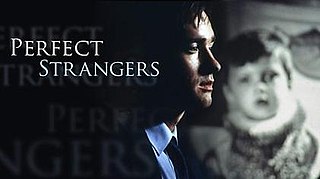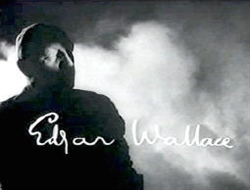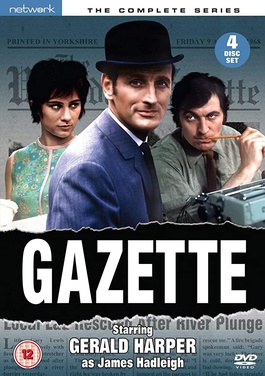Related Research Articles
John Richard Hopkins was an English film, stage, and television writer.

Perfect Strangers is a television drama first aired in 2001, produced for BBC Two. It was written and directed by Stephen Poliakoff, and starred Michael Gambon, who won a British Academy Television Award for his performance, Lindsay Duncan, Matthew Macfadyen, Claire Skinner, and Toby Stephens. Anton Lesser and Timothy Spall also appear. The drama received two Royal Television Society Awards and a Peabody Award. It was also nominated for the BAFTA TV Award for Best Drama Serial.
Theatre Parade was a British television programme, one of the world's very first regular series, broadcast by the BBC Television Service from its inception during 1936 until 1938. The programme presented excerpts from popular London theatre productions of the time performed by the theatre cast from the BBC's studios at Alexandra Palace.
For the Children was the umbrella title given to British television programmes and sequences targeted at children of school age, in the early years of the BBC Television Service. The title was first used in 1937 at 3pm as the opening programme for afternoon viewing. Suspended in 1939 along with the rest of BBC Television for the duration of World War II, it returned on 9 June 1946, running on Sunday afternoons and expanded to twenty minutes in length.
Starlight is an early British television programme, one of the first regular series to be broadcast by the BBC Television Service during the 1930s. Its first edition was broadcast on 3 November 1936 – the day after the service had officially begun – and it continued to be broadcast until the suspension of television for the duration of the Second World War during 1939. After the resumption of BBC television during 1946, Starlight was one of the few pre-war programmes to be reinstated, and it was broadcast for a further three years until 1949.

The Edgar Wallace Mysteries is a British second-feature film series mainly produced at Merton Park Studios for Anglo-Amalgamated. There were 48 films in the series, which were released between 1960 and 1965. The series was screened as The Edgar Wallace Mystery Theatre on television in the United States.
For Whom the Bell Tolls is a British television series first aired by BBC in 1965, based on the 1940 novel by Ernest Hemingway. It stars John Ronane, Ann Bell, Julian Curry, Glynn Edwards and Joan Miller. The film was adapted for television by Giles Cooper, was produced by Douglas Allen, and was directed by Rex Tucker. It consisted of four 45-minute episodes, the first of which aired on 2 October 1965. The last episode aired 23 October 1965. According to the BBC archives none of the episodes of the film still exist.
Armchair 30 is an anthology drama series of short plays produced by Thames Television and broadcast in 1973. The series was a spin-off from Armchair Theatre.
Isabel Ruth Trouncer is a British stage, film and television actress. During the late 1950s she had a recurring role on the television series The Larkins.

Gazette is a British television series which first aired on ITV in 1968. It starred Gerald Harper as James Hadleigh, a millionaire who relocates from London to Yorkshire and buys a local newspaper founded by his father many years before. The cast also included Jon Laurimore, Ralph Michael and Gillian Wray. Harper had just come off his starring role in the BBC series Adam Adamant Lives.
Neil Stacy is a British actor particularly known for his role in the 1980s television series Duty Free.

Thirty Minutes Worth is a British television comedy sketch show which aired on ITV in three series during 1972 and 1973. It was created as vehicle for the comedian Harry Worth. Following the series he went on to appear in the 1974 sitcom My Name Is Harry Worth, also produced by Thames Television at Teddington Studios.
Mr. Pastry's Progress is a British comedy television series which originally aired on the BBC from 1950 to 1951. Richard Hearne appeared as his character Mr. Pastry. The original series featured fifteen minute episodes, which was broadcast live. It later returned for a 1962 series of the same title. It lasted for six episodes, and co-starred Barbara Hicks.
The Stanley Baxter Series is a British comedy television show which was originally broadcast on the ITV in 1981. It was Baxter's first weekly sketch show for nine years since the first series of his The Stanley Baxter Picture Show, as he had concentrated on producing one-off specials since then. Baxter was nominated for the British Academy Television Award for Best Entertainment Performance losing out to Nigel Hawthorne for Yes Minister.
Hancock is a British comedy television series which aired on ITV in 1963. It starred Tony Hancock as a pompous, self-regarding figure similar to the character he had played on Hancock's Half Hour for the BBC, but with different scriptwriters.
Charlie Drake is a British comedy television showed which aired on the BBC from 1958 and 1960. It starred the comedian Charlie Drake in a series of stand alone half-hour shows, sometimes billed as Charlie Drake In.... It was followed by The Charlie Drake Show.

The Sullavan Brothers is a British television drama series created by Ted Willis which originally aired 1964–1965 on ITV in 26 episodes.
Deadline Midnight is a British television series which originally aired on ITV between 1960 and 1961. It focuses on the employees of a London daily newspaper.
Hold the Back Page is a British television series which originally aired on BBC One between 12 November 1985 and 28 January 1986. A sports reporter transfers from a broadsheet to a tabloid.

Give Us a Break is a British comedy drama television series which was originally broadcast on BBC One in a series of seven episodes between 22 September an 3 November 1983 with a feature-length Christmas Special the following year.
References
- ↑ Vahimagi p.302